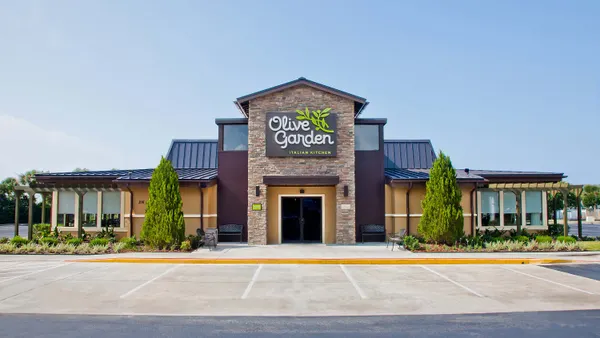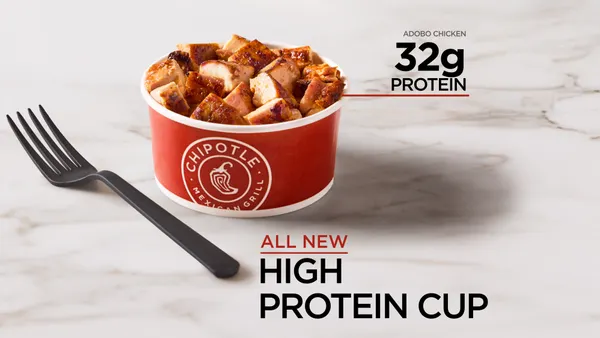Dive Brief:
- The NextGen Cup Consortium, an effort driven by McDonald's and Starbucks, is debuting reusable cup pilot programs at independent coffee shops around San Francisco and Palo Alto, California this week. The consortium is managed by Closed Loop Partners' (CLP) Center for the Circular Economy, with the World Wildlife Fund serving as an advisory partner and design firm IDEO running the pilots.
- The pilot programs will see reusable cups outfitted with tracking codes and chips introduced in place of traditional disposable paper and plastic cups. Returnable packing service startups Muuse designed the cup for San Francisco while CupClub designed the model for Palo Alto.
- A long-term goal is to introduce the cups into major chains. Conrad MacKerron, senior vice president for the shareholder advocacy nonprofit As You Sow, told Waste Dive the programs are "a key first step" toward shifting companies like Starbucks "away from single use packaging and towards reusables." He added "there will need to be a lot of market testing to study, encourage, and induce customer behavior change."
Dive Insight:
NextGen's Cup Challenge, launched in 2018, has focused on creating a more sustainable and economically sound alternative to traditional beverage containers. Many paper cups in particular are often a challenge to recycle, given their plastic lining.
The concepts being introduced by two different start-ups take a very different approach to what most consumers currently experience. The Muuse cups in San Francisco come with QR codes and are intended to be scanned upon pick-up and drop-off within five days, with patrons given a 25-cent discount. Failure to return the cups will result in a $15 charge. CupClub models will meanwhile have RFID tags and can be stacked at drop-off points in Palo Alto.
"In previous pilots we have achieved a 97% return rate through return incentives and product features in app," CupClub founder and CEO Safia Qureshi told Waste Dive. "We will be keeping a close eye on these metrics during the pilot."
Georgia Sherwin, a CLP spokesperson, told Waste Dive the Muuse cups are made from powder-coated, double-walled stainless steel, and come with a polypropylene lid and a silicone seal. The CupClub are composed of virgin polypropylene, with low-density polyethylene lids. Both programs will play out over a one-month trial period.
The pilot programs are limited to two cities, but the NextGen Cup Challenge is seeking a "moon shot" attempt to provide solutions for both hot and cold beverage containers on a larger scale. Other members include Coca-Cola, Wendy's, Nestlé, and Yum! Brands, which owns chains such as KFC and Taco Bell.
While groups like As You Sow are supportive, MacKerron highlighted the challenges facing efforts to expand the pilot program beyond regions like the Bay Area.
"We hope there will be significant trials done in areas that aren’t typically politically progressive to understand better the challenges of making the transition there," he said.
The new pilot programs come amid a wider shift as industry players face public scrutiny and increasing pressure to meet their climate and environmental goals. Last month, Starbucks announced plans to achieve a 50% reduction in waste sent to landfills from both stores and manufacturing by 2030. The company said it aims to be "resource-positive" and the announcement also included a commitment to continuing the NextGen Cup Challenge.
Blue Bottle, an upscale coffee chain, meanwhile uses compostable sugarcane cups, but said in 2019 much of that waste still winds up in landfills, contributing to climate change. By the end of 2020, the company is aiming to achieve 90% "zero waste" through reusable cups, beginning with a San Francisco-area pilot program. Nestlé notably owns a majority stake in the company.
Compostables remain an attractive alternative for companies seeking sustainable alternatives to single-use plastics and proponents argue they bridge an important gap between disposables and a completely reusable system. Beginning in March, Footprint LLC and PTT MCC Biochem Company Limited will debut either compostable or recyclable cups in Oakland, California as part of NextGen's ongoing efforts. But MacKerron indicated a preference for recyclability over compostability.
"There should be priority focus on making the cups recyclable and ensuring they get recycled," he said.
NextGen's different pilot programs reflect the "diversity of solutions" available to addressing waste issues, CLP Managing Director Bridget Croke told Waste Dive. "These pilots illustrate how we are promoting ecosystem innovation, honing a suite of solutions to ensure success across different social, economic and geographical contexts," she said.
An emphasis on reusable cups is also taking off in other cities. For example, the Boston-based Coffee Cup Collective offers a "reusable cup equivalent to bike sharing programs." The collective partners with cafes throughout the wider metro area and delivers, tracks and cleans the cups. A smartphone application also provides information about drop-off access sites around the area, giving users seven days to do so.









